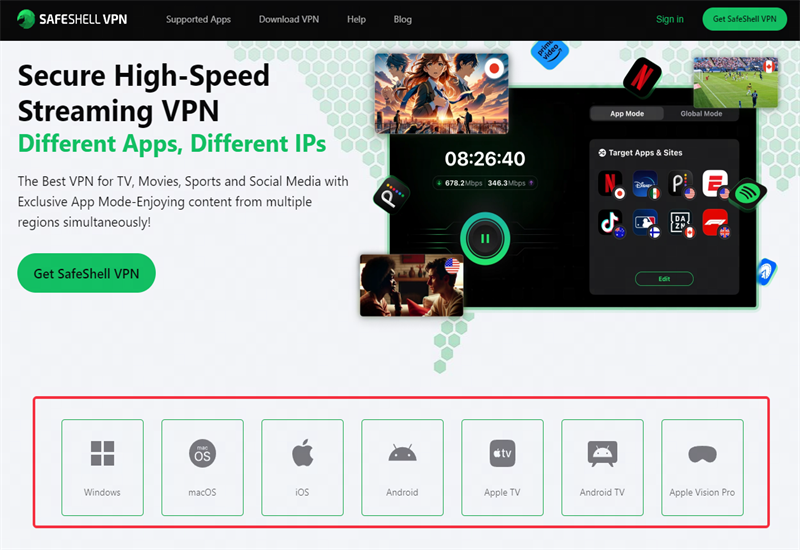Radmin VPN vs SafeShell: Gaming or Streaming?
Is a specialized virtual LAN tool like Radmin VPN actually better than a full-featured VPN for today's digital needs? In my years testing VPN solutions, I've noticed this question sparks heated debates among both casual users and networking professionals. While some swear by dedicated tools for specific purposes, others believe versatility trumps specialization in our increasingly complex online world.

Understanding Radmin VPN: A Niche Solution
Radmin VPN is not your typical virtual private network service. Rather than focusing on privacy and general internet security, it serves a very specific purpose: creating virtual local area networks (LANs) over the internet. This Windows-only application allows devices located anywhere in the world to interact as if they were connected to the same physical network.
The standout features of Radmin VPN include:
- Completely free service with no subscription required
- Easy setup process accessible to novice users
- Support for speeds up to 100 Mbps
- Access to over 1,000 gaming networks created by other users
- 256-bit AES encryption for data shared within the virtual LAN
During my testing, I found Radmin VPN particularly useful for gaming scenarios where friends wanted to play LAN-compatible games together despite being physically distant. The application worked as advertised, creating a secure tunnel between connected computers with minimal configuration required.
The Limitations of Specialized Tools
Despite its effectiveness for its intended purpose, Radmin VPN has significant limitations compared to full-featured VPN services:
- Windows-only compatibility - No support for macOS, iOS, Android, or other platforms
- No general traffic encryption - Only secures data within the virtual LAN, not your regular browsing
- Lack of advanced security features - No kill switch, DNS leak protection, or other privacy safeguards
- No IP masking capabilities - Doesn't hide your real IP address from websites you visit
- Security concerns with public gaming servers - Some networks contain illegal software
These limitations highlight an important reality: specialized tools excel at specific tasks but often leave users vulnerable in other areas. For anyone needing comprehensive online protection, Radmin VPN simply doesn't offer enough.
SafeShell VPN: A Versatile Alternative
While researching alternatives, I've been impressed by SafeShell VPN 's versatility compared to Radmin's narrower focus. Unlike Radmin, SafeShell offers comprehensive protection alongside specialized features for streaming and entertainment.

SafeShell VPN provides:
- Multi-platform support for Windows, macOS, iOS, Android, Apple TV, Android TV, and even Apple Vision Pro
- High-speed servers optimized for streaming with no bandwidth limitations
- Advanced security features through their proprietary "ShellGuard" VPN protocol
- App Mode that allows accessing content from multiple regions simultaneously
- Support for up to five devices connected at once
The performance difference is notable as well. While Radmin caps at 100 Mbps, SafeShell's servers consistently delivered faster speeds in my tests, particularly when streaming high-definition content from services like Netflix.
Performance Comparison: Gaming vs. Streaming
When comparing these services, it's important to consider your primary use case:
| Feature | Radmin VPN | SafeShell VPN |
|---|---|---|
| Primary Use Case | Virtual LAN for gaming | Streaming, privacy, security |
| Speed | Up to 100 Mbps | Unlimited with optimized servers |
| Platforms | Windows only | Windows, macOS, iOS, Android, Smart TVs |
| Encryption | 256-bit AES (LAN only) | Full traffic encryption |
| IP Masking | No | Yes |
| Streaming Support | No | Optimized for multiple services |
| Price | Free | Subscription with free trial |
For gaming with friends on a virtual LAN, Radmin's simplicity and free price point make it attractive. However, for nearly everything else—streaming, privacy, cross-platform use—SafeShell provides significantly more value.
Real-World Scenarios: When Each Makes Sense
I've found Radmin VPN works well for:
- Playing older LAN games with friends online
- Accessing shared resources between remote computers
- Simple file sharing between team members
- Zero-cost virtual networking for small projects
Meanwhile, SafeShell VPN excels at:
- Streaming region-locked content from Netflix and other services
- Protecting your browsing on public Wi-Fi
- Securing multiple devices across different platforms
- Accessing content from multiple regions simultaneously
The Broader Question: Specialization vs. Versatility
This comparison raises interesting questions about our approach to digital tools. Should we use specialized applications for each specific need, or is there greater value in versatile solutions that address multiple requirements?
On one hand, Radmin's laser focus on virtual LAN functionality makes it exceptionally good at that specific task. It's lightweight, free, and doesn't include unnecessary features that might complicate the experience.
On the other hand, SafeShell VPN's comprehensive approach means fewer applications to manage, consistent security across different activities, and potentially better value for most users who have diverse needs.
Perhaps the most thoughtful approach isn't choosing one philosophy over the other, but recognizing when each makes sense. For businesses with highly specialized needs and existing security infrastructure, tools like Radmin might complement their existing setup. For individual users seeking simplicity and comprehensive protection, versatile solutions like SafeShell likely offer a more practical path forward.
What's your experience with specialized versus versatile digital tools? Have you found value in using dedicated applications for specific tasks, or do you prefer solutions that address multiple needs at once? The answer likely depends on your unique situation—and might even change as your digital life evolves.



